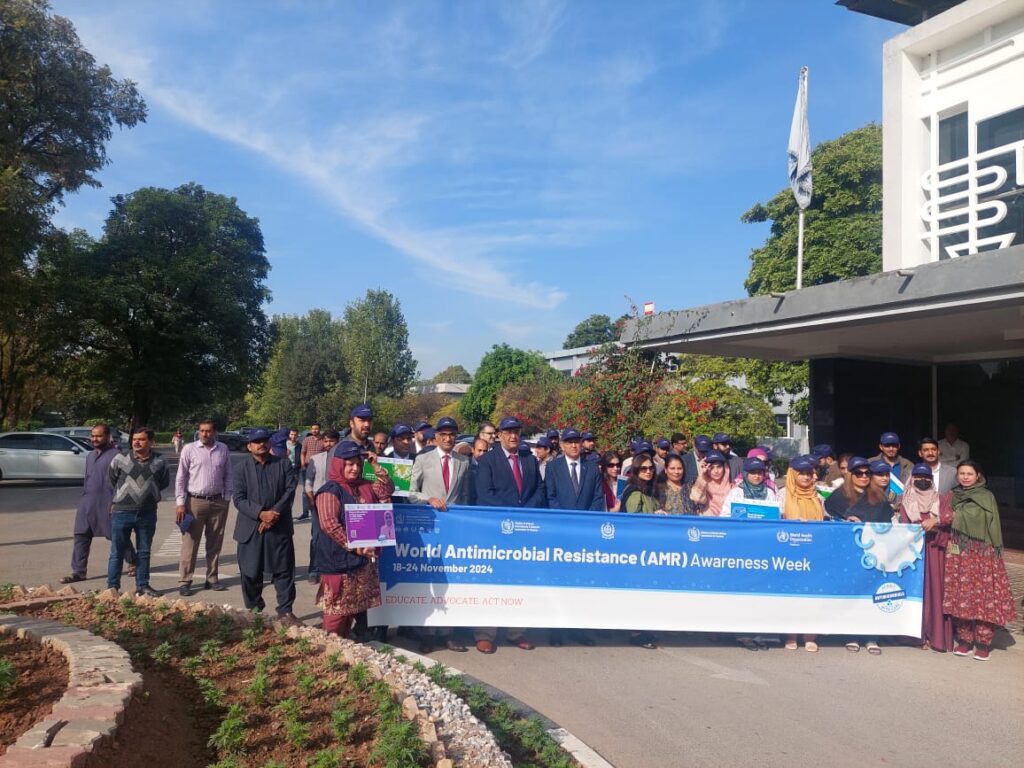
Islamabad: Pakistan’s second National Action Plan (NAP-2) to combat the growing threat of Antimicrobial Resistance (AMR) has been finalized and will soon be implemented following formal government approval, officials from the National Institute of Health (NIH), Islamabad, announced.
“Like other countries, Pakistan is also struggling with the serious challenge of AMR. To counter this threat, the NIH has finalized the country’s second National Action Plan, which will be implemented with the support of provincial governments and national and international donor organizations,” said Dr. Muhammad Salman, Executive Director NIH, while addressing participants of an AMR awareness walk.
The walk, organized by NIH in collaboration with the World Health Organization (WHO), The Fleming Fund, Getz Pharma, and other stakeholders, marked the formal start of ‘World AMR Awareness Week 2024,’ observed globally from November 18 to 24. The event aims to raise awareness about AMR and promote best practices to reduce the emergence and spread of drug-resistant infections.
Dr. Salman explained that AMR occurs when bacteria, viruses, fungi, and parasites no longer respond to antimicrobial agents, rendering antibiotics and other treatments ineffective. “This makes infections increasingly difficult to treat, escalating the risk of disease spread, severe illness, and death,” he noted.
“In Pakistan, extensively drug-resistant (XDR) infections have become a serious threat in communities, while bloodstream infections in hospitals are increasingly challenging to treat due to antimicrobial resistance. Hospital-acquired infections are also becoming harder to manage,” he added.
Dr. Salman urged stakeholders, including the public, healthcare professionals, and organizations, to work collectively to contain the spread of drug-resistant infections.
The NIH official cautioned against self-medication and advised healthcare practitioners to prescribe antibiotics only when absolutely necessary and also stressed the need to regulate the use of antibiotics in the livestock and agricultural sectors.
WHO’s Acting Representative in Pakistan, Dr. Zain, warned that by 2050, three people could die every minute from drug-resistant infections if this menace is not addressed. “All stakeholders, including regulators, federal and provincial departments, healthcare professionals, and academics, must collaborate to counter AMR in Pakistan,” he urged.
Head of Infectious Diseases at Pakistan Institute of Medical Sciences (PIMS), Islamabad, Prof. Nasim Akhtar, highlighted the growing challenge of treating hospital-acquired infections due to drug-resistant bacteria and pathogens.
She called for increased public and healthcare community awareness about the irrational use of antibiotics. “Both patients and doctors must avoid unnecessary antibiotic use,” she advised.
NIH’s AMR Lead, Dr. Omera Naseer, noted that the theme for World AMR Awareness Week (WAAW) 2024 is “Educate. Advocate. Act now.” She emphasized that this year’s theme urges the global community to educate stakeholders about AMR, advocate for bold commitments, and take concrete actions to combat it.
Jaffer Bin Baqar, Lead Public Health and Research at Getz Pharma, highlighted his organization’s collaboration with NIH and the Ministry of Health following their Antimicrobial Stewardship Summit in Karachi. He said that Getz Pharma is at the forefront of combating AMR in Pakistan through public awareness programs, collaborations with medical societies, and workshops at key medical events to promote responsible antimicrobial use and best practices for stewardship.
The event also featured a poster competition among schoolchildren, showcasing their creativity in highlighting AMR through artwork. The top three entries were awarded prizes by NIH and partner organizations. (Ends)